- Home
- Chris Wraight
The End Times | The Fall of Altdorf
The End Times | The Fall of Altdorf Read online
Table of Contents
Cover
Title Page
Warhammer
Illustrations
Part One
One
Two
Three
Four
Five
Part Two
Six
Seven
Eight
Nine
Ten
Eleven
Twelve
Thirteen
Fourteen
Fifteen
Part Three
Sixteen
Seventeen
Eighteen
Nineteen
Twenty
Twenty-One
Twenty-Two
Twenty-Three
Twenty-Four
Twenty-Five
Epilogue
About The Author
Legal
eBook license
The world is dying, but it has been so since the coming of the Chaos Gods.
For years beyond reckoning, the Ruinous Powers have coveted the mortal realm. They have made many attempts to seize it, their anointed champions leading vast hordes into the lands of men, elves and dwarfs. Each time, they have been defeated.
Until now.
In the frozen north, Archaon, a former templar of the warrior-god Sigmar, has been crowned the Everchosen of Chaos. He stands poised to march south and bring ruin to the lands he once fought to protect. Behind him amass all the forces of the Dark Gods, mortal and daemonic. When they come, they will bring with them a storm such as has never been seen. Already, the lands of men are coming to ruin. Archaon’s vanguard run riot across Kislev and make inroads into the north of the Empire. The once-proud country of Bretonnia has fallen into anarchy. The southern lands have been consumed by a tide of verminous ratmen. And in the trackless forests of the Empire, there are whispers that another ancient power is rising. The Great Necromancer, Nagash, has returned to the world, and none know if his armies of the dead will stand against the hordes of Chaos, or fight beneath their banners.
The men of the Empire, the elves of Ulthuan and the dwarfs of the Worlds Edge Mountains fortify their cities and prepare for the inevitable onslaught. They will fight bravely and to the last. But in their hearts, all know that their efforts will be futile. The victory of Chaos is inevitable.
These are the End Times.
ONE
The tent’s walls flapped in the cold west wind, making the fires in the torches spit and gutter. Its lone occupant knelt on mud-slick grass, bowing his head before a makeshift altar. A rich red cloak hung, rain-heavy, from his armoured shoulders. His gauntlets were crossed on the hilt of a proffered sword, thrust naked and point-down into the earth in the knight’s fashion.
His eyes remained closed. He was un-helmed, exposing a lean, noble face lost in prayer. His hair was close-cropped and mottled with the marks of the battlefield – mud, blood, lines of old sweat.
The altar was small, and had been carried with his baggage ever since his first days as a squire. It was made of rosewood, with a carved representation of twin griffons facing one another across the battered top face. It was a cheap thing, in truth. He could have had it replaced with a gold-plated one by now, or employed priests to pray on his behalf, but he had prayed before that same altar for thirty-two years, and was not about to change now. Not today, of all days.
‘My lord Heldenhammer,’ he whispered, his breath steaming in the dawn’s chill. ‘As I have ever been faithful, remember Your servant this day. I fear no death, no pain, no trial, if it be in Your service. I admit only one fear: to prove unworthy of the sword I bear, the armour I wear, the men I command.’
From outside the tent, the noises of a preparing army could be heard – horses being led to their riders, artillery pieces being hauled across the furrowed earth on iron-rimmed wheels. He could hear the muffled roaring of battle-priests, rivalled only by the parade-ground shouts of sergeants and captains.
He had heard such sounds all his life. Ever since childhood, the instruments of war had been around him. In that, if in no other way, this day was little different.
‘When I slay, let it be in Your name. When I face the darkness, let it be in Your name. And when the hour comes, and when my service ends, let it be that I reflected honour to You in the time that I was given.’
Rain started up again, drumming on the already sodden canvas. The downpour would make the earth well with water, hampering the charge of the warhorses.
‘Let it be,’ he prayed, near-silently, ‘that no man has cause to doubt my devotion, and that they will say nothing more of me, after I am gone, but that I fulfilled my vows.’
He opened his eyes, and stood stiffly. He took up his sword and sheathed the blade, then made the sign of the comet across his breastplate and bowed a final time. As he did so, the wind whipped around the tent-walls, brushing ice-cold rain under the skirts.
He reached for his helm, held it loosely in his left hand, and turned to the entrance flaps.
Outside, they were waiting for him.
Schwarzhelm glowered massively in the drizzle, his heavy broadsword already unsheathed, his great beard dank and draggled. Huss stood in his shadow, scarce less brutal in mien, moisture running in trickles down his bald pate. The boy Valten was beside him, grasping Ghal Maraz one-handed as if it weighed less than a stick of straw. Helborg stood apart, magnificent in his war-plate, steel-clad, hard and hawk-like.
Behind them were the generals, the warriors, the foot soldiers, the knights, the halberdiers, in white and red and yellow and chequered black and carrying the serried weapons of the Empire in readiness.
As one, they raised those blades.
‘Karl Franz!’ they roared.
At that, the Elector Count of Reikland, the Prince of Altdorf, the Bearer of the Silver Seal and the holder of the Drachenzahn runefang, Emperor of all Sigmar’s holy inheritance between the Worlds Edge Mountains and the Great Sea, nodded in acknowledgement.
‘Gentlemen,’ he said. ‘Let us begin.’
Heffengen, like all towns in the upper Ostermark, was fortified. Thick stone walls enclosed its tight streets of wattle-and-daub dwellings, overlooked by steep tiled roofs. Those walls, though, had been left to rot by a neglectful burgomeister, whose body now swung from a high gibbet over the gates.
Perhaps the burgomeister had done the best he could. Perhaps the plague or the heavy draft of fighting men had made his job impossible. It hardly mattered now – an example had to be set.
With the walls in their state of disrepair, Karl Franz had decided that a defence of the town itself was impossible. In any case, the army he had mustered would have struggled to fit inside, and so the coming battle would be fought on the plains, out in the open, under the rain and the watchful eyes of whatever gods deigned to observe.
Squalls continued to drive hard from the north-west, bearing more moisture with them. The land stretched away to a steel-grey horizon, glistening with standing water atop soft black earth. A few blasted trees hunched over here and there, dark against the water-heavy sky.
Karl Franz had drawn his forces up on the wastelands a mile north of Heffengen’s limits. The battlefield was bounded on the east by the deep cleft of the Revesnecht river as it snaked north towards the greater flood of the Talabec. Over to the west, open ground slowly gave way to the straggling fronds of marginal forest.
The enemy would come at them from the north, just as they always did. They would sweep over the moors, fresh from their slaughter at the Auric Bastion, tearing up sodden ground under brazen hooves. The hounds would come first, loping with jaws agape; then the cavalry on their red-eyed mounts; then, striding o
n cloven hooves, the armoured behemoths with spiked helms and skulls hanging from blood-glossed armour.
Their formations would be ragged, powered onward by lust for slaughter. The one defence, the only advantage possessed by mortal men, was discipline. Just as had been the case for a hundred lifetimes, raw mania would be met by ordered lines of Imperial steel.
General Talb had petitioned hard for the honour of guarding the eastern flank. His ranks of Ostermarkers stood in place, arranged into squares of halberdiers and pikemen. They were supported by units of gunners and swordsmen, including a contingent of mercenary ogres who towered over the warriors around them. Huss had taken his fanatics with him to bolster Talb’s lines, though the warrior priest’s presence alone was worth more than all the zealots he brought with him. Valten, as ever, accompanied his mentor.
Karl Franz had watched them go. It remained uncomfortable to see the holy warhammer borne by hands other than his own. Gelt had counselled against it from the start, but the decision had not been his to make.
What brought you down? thought Karl Franz, ruminating on Gelt’s disgrace and departure. Pride? Weakness of will? Or just, like so many before you, despair?
So much had changed, and in so short a time. The mighty defensive bastion Balthasar Gelt had raised across the Empire’s northern borders had been breached at last, freeing the hordes of the Wastes to pour into Ostermark like blood fountaining from a wound. The strain of maintaining it had turned the Gold Wizard’s mind in the end, damning him to association with fallen souls he would not have so much as spat on while sane.
Gelt had not deserved his sudden fall from grace, not after the service he had rendered, but then so many did not deserve the fates that had befallen them, and there was no leisure to mourn them all.
You could have fought here with us. Your spells might have turned them back.
‘You will not ride out,’ grunted Schwarzhelm.
Karl Franz smiled. His bodyguard had been fighting solidly for weeks, first on the Bastion, now as part of the long retreat south from the breach at Alderfen. He was caked with grime, much of it flecked amongst the curls of his immense beard.
‘The choice is mine, Ludwig,’ he reminded him.
‘Ludwig is right, my lord,’ said Helborg. ‘They wish to draw you out. We may fall in battle, you may not. You are the Empire.’
You are the Empire. Those words always gave Karl Franz a cold twinge of unease, though he had heard them many times before.
It was a comfort, though, to hear his two lieutenants in agreement. Such had not always been the case.
‘The judgement will be mine,’ Karl Franz said, firmly. ‘As ever, Sigmar will guide.’
The three of them stood at the very centre of the Empire battle lines, set some way back from the front ranks. Ahead of them was arrayed the main force of Reiklanders, decked in white and red. Three whole regiments of the Palace guard had been assembled, flanked by greater numbers of regular troops. Like the Ostermarkers to the east, the halberdier squares formed the backbone, supported by ranged weaponry – bowmen, handgunners, light artillery pieces. The elite of the entire army, the Reiksguard cavalry, had formed up to the left, waiting for their lord Helborg to join them. Proud banners bearing the Imperial griffon and black cross of the knightly order hung limp in the drizzle.
It looked solid. Rows and rows of steel glinted dully in the grey light, close-serried and well-drilled. Sharpened stakes protruded from the earth in steed-killing lines, dripping dankly in the morning mist.
‘And Mecke?’ asked Schwarzhelm.
The west flank was held by Lord General Mecke of Talabheim, whom Karl Franz thought was an ambitious bastard with an unseemly enthusiasm for the coming slaughter. Still, his men were as disciplined as any of the others, and he had numbers. The red and forest-green livery of his infantry squares was just visible to the west, part-shielded by fringes of foliage. The greater part of the artillery pieces were there too, lodged on higher ground and with a commanding vantage over the open field.
‘He knows his business,’ said Karl Franz. ‘Nothing more to be done, now.’
Helborg wiped a sluice of rainwater from the visor of his hawk-winged helm. Karl Franz could see he was anxious to be gone, to saddle up and join his men. That man was only truly happy on the charge, his runefang in his fist and the thunder and crash of arms around him. He would have made a poor statesman, so it was fortunate he had never been charged with that role. Killing suited him better than bartering.
‘I can smell them already,’ said the Reiksmarshal.
Karl Franz turned his gaze north. Beyond the furthest ranks of the central defence, the land ran away, bleak and empty. Eddies of rain whipped across the mud.
‘You should go, Kurt,’ said Karl Franz.
Helborg pushed his cloak back, drew his sword and saluted. ‘This day will see the line restored.’
Always confident, always brash.
Karl Franz acknowledged the salute. ‘Should we lose the field–’
‘We cannot lose,’ muttered Schwarzhelm.
‘Should we lose the field, they will press for Altdorf. We discussed what is to be done then.’
‘Middenheim is closer, and stronger,’ said Helborg, repeating what he had argued in the war council two days ago. ‘I still think–’
‘I have spoken,’ said Karl Franz, holding the Reiksmarshal’s gaze calmly. ‘These are desperate times. I have no faith in electors, wizards have proven themselves unreliable, and I barely understand Huss’s motives.’ He smiled, clapping an armoured hand on Helborg’s shoulder. ‘We are the Empire. Men. Altdorf is the key. It always has been, and they know it too.’
Helborg looked, for a moment, like he might argue the point. Then he bowed. ‘It matters not – we will drive their bones into the earth. Here is where the tide turns.’
‘Well said,’ said Karl Franz. ‘Now go in faith.’
‘Always.’
Helborg strode off. As the Reiksmarshal walked down through the ranks, attendants hurried after him. Soon he would be mounted, blade in hand, poised at the forefront of the Reiksguard’s formation.
Schwarzhelm stayed put. His unsmiling eyes strayed over to the stockade behind them, where Deathclaw had been chained. The griffon’s scent penetrated through all the others – a wild, bitter aroma, suggestive of raw meat and frenzy.
‘I know what you’re thinking, Ludwig,’ said Karl Franz.
‘Listen to Kurt, if you will not listen to me,’ grumbled the old warrior.
Karl Franz laughed. ‘I don’t know what to worry about more – them, or the fact you’re both speaking with one voice. It’s almost as if Averland never happened.’
Schwarzhelm’s face did not so much as twitch from its mask of belligerent certainty. His trials in the south were almost forgotten now, washed away by the greater war of the north. Combat with an enemy he understood had restored him to his former self, it seemed.
He looked about to say something else, no doubt some plea for the Emperor to remember his place at the rear of the army, and not to go charging off into the fray like some avatar of Sigmar reborn. Such counsel was Schwarzhelm’s duty, of course, just as it was Karl Franz’s prerogative to make his own damned mind up.
In the event, Schwarzhelm said nothing. Any words he might have uttered were snatched from his lips by a clamour rising up out of the north. It started off low, like the growl of beasts at bay, then picked up in volume, carried by the skirling winds and wafted across the empty land.
Soon it was a howl, a mass of screaming and roaring. Drums underpinned it, making the standing waters shiver. The northern horizon darkened, as if storm clouds had boiled into existence in defiance of the law of nature.
Then Karl Franz saw the truth – the clouds were birds, thousands of them, flocking unnaturally. They blotted out the meagre sunlight in a fast-moving scab of ragged black, sweeping out of the mist and circling clear of arrow-range.
The howling continued, muffled by distance
for the moment, but that would not last. All along the Empire lines, sergeants bellowed at their men to hold fast, to grip their halberds ready, to remember their vows, to take no damned backward step or their bones would be first to feel the crack of the maul.
Schwarzhelm’s grizzled face tightened. His burly hand crept automatically to the hilt of his great blade, the Rechtstahl, the famed Sword of Justice.
‘Here they come,’ he murmured.
Karl Franz heard Deathclaw’s agitated growling from behind the stockade. The war-griffon was eager to tear at the foe. The beast might not have to wait much longer.
‘Unto death,’ he breathed, feeling the weight of the runefang at his belt. ‘Never yield.’
The enemy charged under the shadow of crows.
The birds wheeled and dived across the Empire defences, cawing maddeningly. Detachment captains forbade the wasting of arrows against such fodder, and so the birds were left unmolested to crash and flap into the waiting soldiers. They clawed at faces and fingers, and soon the halberdiers were flailing at them, their exposed flesh running with lacerations.
Runners broke out of the mist next, hundreds of them, isolated and without formation. From atop his mount, Helborg watched them come. No Imperial gunner opened up at them yet, giving the runners an unimpeded charge at the Empire positions. They careered mindlessly, limbs cartwheeling, eyes staring. Some were naked and daubed with inks across their snow-pale flesh; others were riddled with disease, their eyes staring and red-rimmed. All were lost in battle-fury, triggered by the poisons they had been fed by their shamans.
Helborg curled his lip in disgust. The first of the baresarks hurled themselves into the outer lines of pikemen. He saw one skinny lunatic impale himself on the stakes designed for the cavalry, and writhe there in a kind of wild-eyed ecstasy. Others slammed into the waiting defenders, and the halberds rose and fell, slewing up tatters of plague-sick gore.
Helborg felt his steed twitch under him. The warhorse knew what was coming, and was eager for it. Cold wind, still laced with fine rain, hissed up against its barding, chilling the muscles beneath.

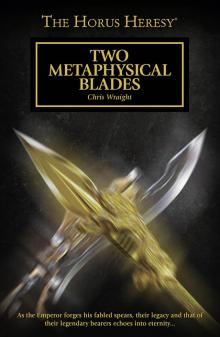 Two Metaphysical Blades
Two Metaphysical Blades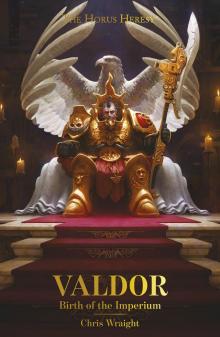 Valdor: Birth of the Imperium
Valdor: Birth of the Imperium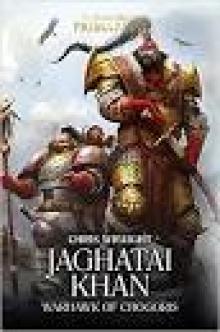 JAGHATAI KHAN WARHAWK OF CHOGORIS
JAGHATAI KHAN WARHAWK OF CHOGORIS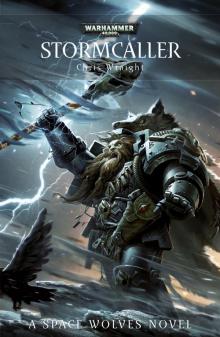 Stormcaller
Stormcaller Child of Chaos
Child of Chaos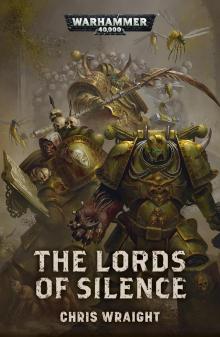 The Lords of Silence
The Lords of Silence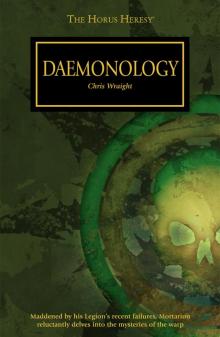 Daemonology
Daemonology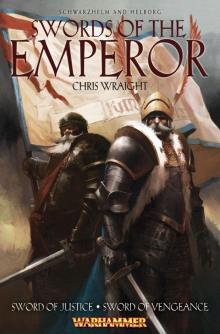 Swords of the Emperor
Swords of the Emperor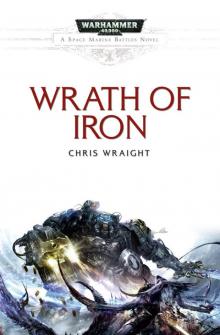 Wrath of Iron
Wrath of Iron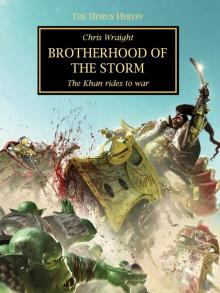 Brothers of the Storm
Brothers of the Storm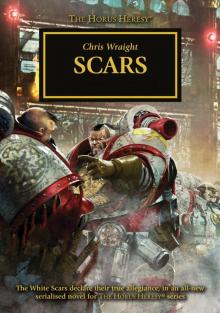 Horus Heresy: Scars
Horus Heresy: Scars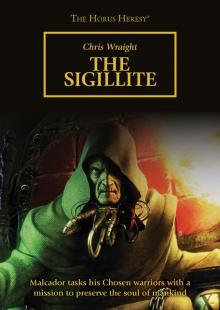 The Sigillite
The Sigillite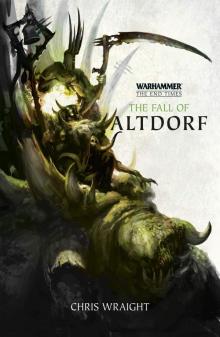 The End Times | The Fall of Altdorf
The End Times | The Fall of Altdorf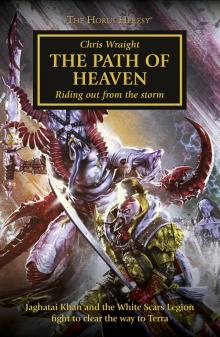 The Path of Heaven
The Path of Heaven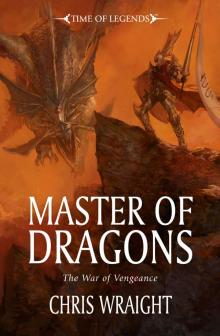 Master of Dragons
Master of Dragons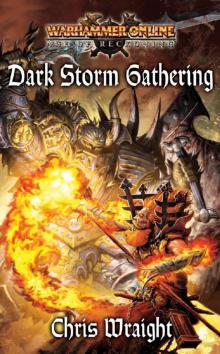 WH-Warhammer Online-Age of Reckoning 02(R)-Dark Storm Gathering
WH-Warhammer Online-Age of Reckoning 02(R)-Dark Storm Gathering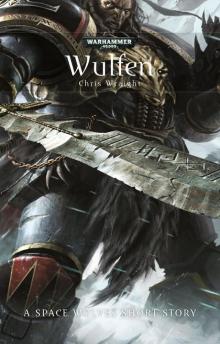 Wulfen
Wulfen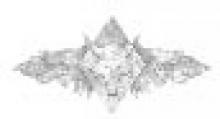 Battle Of The Fang
Battle Of The Fang Onyx
Onyx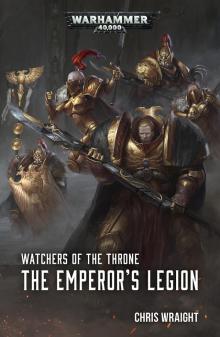 Watchers of the Throne: The Emperor’s Legion
Watchers of the Throne: The Emperor’s Legion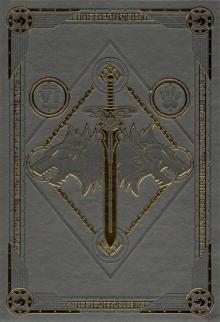 Leman Russ: The Great Wolf
Leman Russ: The Great Wolf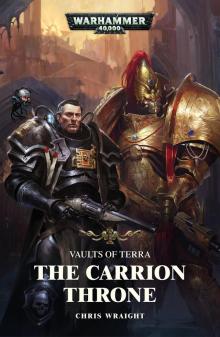 Vaults of Terra: The Carrion Throne
Vaults of Terra: The Carrion Throne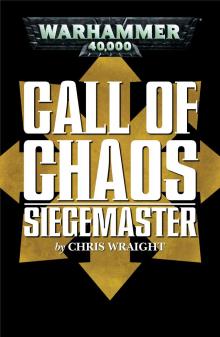 Siegemaster
Siegemaster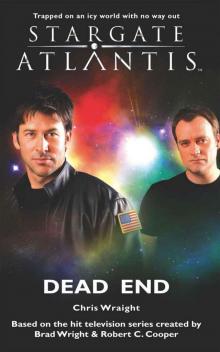 STARGATE ATLANTIS: Dead End
STARGATE ATLANTIS: Dead End Scars
Scars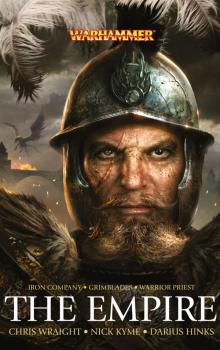 The Empire Omnibus
The Empire Omnibus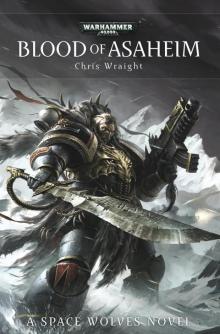 Blood of Asaheim
Blood of Asaheim